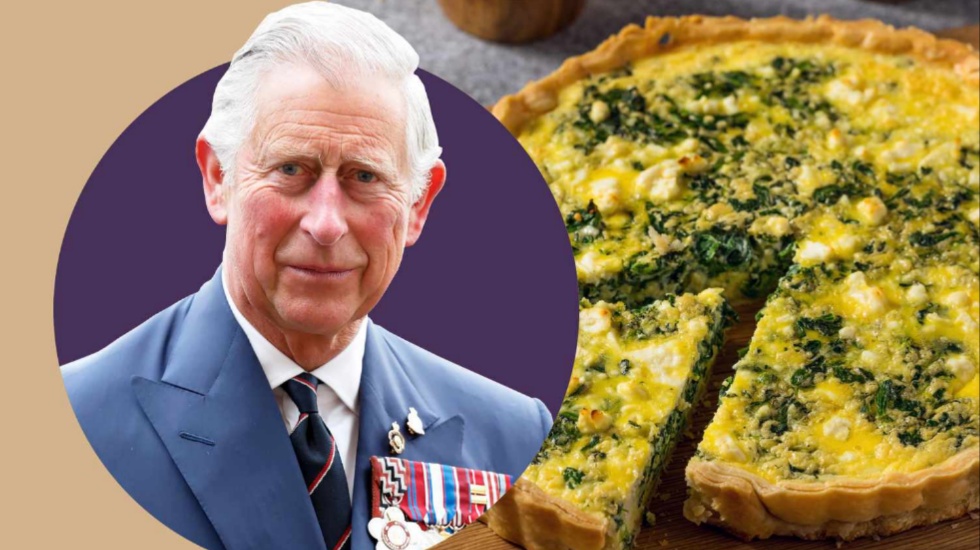The humble quiche will take centre stage at King Charles’ coronation this weekend. Image: Food & Wine. Photos: GETTY IMAGES
So there goes the concept of all people being created equal. How quaint it seems. How utopian. Of course, history is a lesson in inequality, but come the end of this week, it takes on another level.
For then Charles is crowned king, and the hoi polloi, you and I, the lesser people, will be asked to commit an “Homage of the People”. We will be asked to utter these knee-bending words: “I swear that I will pay true allegiance to your majesty, and to your heirs and successors according to law. So help me God.”
Lambeth Palace, which is the London HQ for the archbishop of Canterbury, thought it a breakthrough: “A chorus of millions of voices [will be] enabled for the first time in history to participate in this solemn and joyful moment.”
I shakes me head in disbelief. Seriously? Allegiance? Homage? A breakthrough in obedience and fealty to what should be a discredited and dismantled idea of the divine right of kings, plucked from the bosom of God to reign over us. Succession has nothing on this.
Faiths, other than those of the Christian kind, have been invited along to the coronation. Some might say this is a move in the right direction, diversity, inclusion and all that. But what is it but show? There will even be a prayer, written for the event, that will be sung in the native tongues of Britain – English, Welsh, Scottish Gaelic and Irish, you know the places the rich and privileged conquered centuries ago. Now it’s called Britain’s “rich heritage”. History sighed and moaned.
There are many reasons why the British Royal Family, indeed any royal family, is an affront to the human good of humanity. We could focus on the immense gap between obscene wealth and citizen.
According to Forbes magazine, the British Royals’ wealth stands at $US 28 billion ($42 billion). Yes, the monarchy draws tourism into the country. But it would still draw tourists if the monarchs were not there, the attraction of abandoned castles, regalia and corgis.
But if the coronation bestows anything on the world, let it be as meaningless as this one word: quiche.
Actually, two words: Coronation quiche.
And what did a king do upon the time drawing nigh for this great occasion? Why, he and his Queen, Camilla, sent out to the four corners of the realm, a recipe for quiche. Hereafter to be known as the Recipe for the Coronation of King Charles III.
PLEASE HELP US CONTINUE TO THRIVE BY BECOMING AN OFFICIAL FOOTYOLOGY PATRON. JUST CLICK THIS LINK.
First, the royal description: “A deep quiche with a crisp, light pastry case and delicate flavours of Spinach, Broad Beans and fresh Tarragon. Eat hot or cold with a green salad and boiled new potatoes – perfect for a Coronation Big Lunch!”
Excellent advice. Space dictates condensing the instructions, but in a few words it is this: make your own pastry. Turn the oven on. Mix the ingredients. Bake. Take out when lightly golden. It’s as easy as shooting pheasant for dinner, or amusement.
One could argue, slightly, that Charles is, if nothing else, following tradition (and monarchy is, if nothing else, tradition – perhaps that’s all it is). His mother introduced for her coronation in 1953 the Coronation Chicken, and yegads it had curry and cream. For a country less than a decade clear of WWII, it was pretty exciting.
And for the nation, that was when the excitement stopped. One can describe Charles in many ways, but exciting is not in the lexicon.
A curiosity of the Coronation Quiche is in its path to the royal lunch table. Britain having left those Europeans to their own devices by quitting the European Union has favoured a dish that is a classic of French cuisine.
Its origins, however, are Germanic, as is, irony upon irony, Charles’s family lineage. The inoffensive dish first was cooked up in the medieval kingdom of Lothringen, a disputed region that has changed hands many times. Quiche is actually Kuchen, from the German.
The Windsors before they were the Windsors were the German House of Saxe-Coburg and Gotha. Come the First World War, however, and the British Royal Family, quite rightly, thought having a Germanic name might ever so likely inflame a population that was sending thousands upon thousands of its young men to slaughter.
Charles and Camilla believe that making their quiche is a simple culinary effort to mark the grand day. How hard can it be to bake a quiche, and take it along to the many, many street parties? And you can eat it hot or cold. It’s a win-win for the man and woman in the street who do not have a castle.
Except, there’s a slight problem. There’s something of an egg shortage in the sceptred isle. It’s at its lowest level in a decade. And as everyone knows one simply cannot make a quiche without an egg. Well perhaps everyone knows except a king.
Still, royalty has never been troubled by such trifling matters. The Coronation Quiche is to be served at the palace’s “Big Lunch” on May 7, the day after the coronation.
Whereupon the king can declare, “Let them quiche”.











